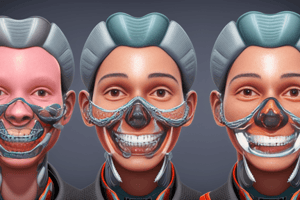Podcast
Questions and Answers
What type of orthodontic treatment focuses on correcting issues before they worsen?
What type of orthodontic treatment focuses on correcting issues before they worsen?
- Interceptive Orthodontics (correct)
- Orthodontic Records
- Comprehensive Orthodontic Treatment
- Surgical Orthodontics
Which type of braces is designed to be less visible when worn?
Which type of braces is designed to be less visible when worn?
- Metal braces
- Clear aligners (correct)
- Lingual braces
- Ceramic braces
What is the primary purpose of retainers in orthodontic treatment?
What is the primary purpose of retainers in orthodontic treatment?
- To maintain teeth position after braces (correct)
- To apply pressure to teeth
- To enhance the aesthetic of orthodontic devices
- To diagnose malocclusion
Which condition is characterized by teeth that overlap excessively vertically?
Which condition is characterized by teeth that overlap excessively vertically?
What aspect is essential for achieving successful outcomes in orthodontic treatment?
What aspect is essential for achieving successful outcomes in orthodontic treatment?
Flashcards are hidden until you start studying
Study Notes
Definition
- Orthodontics is a branch of dentistry focusing on the diagnosis, prevention, and treatment of dental and facial irregularities.
Key Concepts
- Malocclusion: Misalignment of teeth leading to improper bite.
- Braces: Appliances used to correct misaligned teeth; they apply continuous pressure to move teeth into the desired position.
- Types of braces:
- Metal braces
- Ceramic braces
- Lingual braces
- Clear aligners (e.g., Invisalign)
- Types of braces:
- Retainers: Devices used after braces to maintain teeth position.
Common Procedures
- Comprehensive Orthodontic Treatment: Involves full evaluation, planning, and treatment using various orthodontic devices.
- Interceptive Orthodontics: Early intervention to correct issues before they worsen.
- Surgical Orthodontics: Involves jaw surgery for severe cases of malocclusion.
Key Terms
- Cephalometric Analysis: A radiographic technique used to assess the relationships between teeth and jaw structures.
- Orthodontic Records: Documents and images used to track a patient's progress, including study models and X-rays.
- Patient Compliance: Adherence to treatment plans, important for successful outcomes.
Conditions Treated
- Overbite
- Underbite
- Crossbite
- Open bite
- Crowding of teeth
- Gaps between teeth
Treatment Planning
- Initial assessment includes medical history, clinical examination, and radiographic imaging.
- Treatment objectives often involve enhancing function, aesthetics, and bite alignment.
Benefits
- Improved oral health (easier cleaning, reduced decay risk)
- Enhanced appearance and self-esteem
- Better function (chewing, speech)
Considerations
- Treatment duration varies (months to years).
- Factors influencing treatment success include age, complexity of the case, and patient compliance.
Orthodontics: A Branch of Dentistry
- Focuses on the diagnosis, prevention, and treatment of dental and facial irregularities.
- Malocclusion is a misalignment of teeth leading to improper bite.
- Braces are appliances used to correct misaligned teeth.
- Metal braces
- Ceramic braces
- Lingual braces
- Clear aligners (e.g., Invisalign)
- Retainers are devices used after braces to maintain teeth position.
Common Procedures
- Comprehensive Orthodontic Treatment involves full evaluation, planning, and treatment using various orthodontic devices.
- Interceptive Orthodontics is early intervention to correct issues before they worsen.
- Surgical Orthodontics involves jaw surgery for severe cases of malocclusion.
Key Terms
- Cephalometric Analysis is a radiographic technique used to assess the relationships between teeth and jaw structures.
- Orthodontic Records are documents and images used to track a patient's progress, including study models and X-rays.
- Patient Compliance is adherence to treatment plans, which is crucial for successful outcomes.
Conditions Treated
- Overbite
- Underbite
- Crossbite
- Open bite
- Crowding of teeth
- Gaps between teeth
Treatment Planning
- Initial assessment includes medical history, clinical examination, and radiographic imaging.
- Treatment objectives often involve enhancing function, aesthetics, and bite alignment.
Benefits
- Improved oral health (easier cleaning, reduced decay risk)
- Enhanced appearance and self-esteem
- Better function (chewing, speech)
Considerations
- Treatment duration varies (months to years).
- Factors influencing treatment success include age, complexity of the case, and patient compliance.
Studying That Suits You
Use AI to generate personalized quizzes and flashcards to suit your learning preferences.




